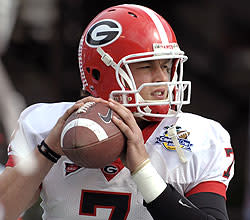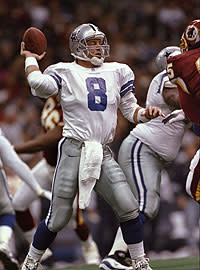Quarterback is a better bet at No. 1 for Lions
A contingent of Detroit Lions fans made it clear where they stand in this year's debate of whether to take a quarterback with the No. 1 overall pick during the NFL draft.
"Cur-ry" and "Don't draft Staf-ford," showing their preference for linebacker Aaron Curry and their reticence for quarterback Matthew Stafford, were the chants during a Monday news conference with Lions president Tom Lewand. However, the reality is that if the Lions believe either Stafford or fellow quarterback Mark Sanchez are worthy of the first pick, taking a signal caller is a better bet than taking a position.
If the goal is to win a Super Bowl, that is.

Lions fans aren't smitten with Stafford.
(Al Messerschmidt/Getty)
If you break down the past 42 years of the draft, starting in 1967 when the old AFL and NFL started a combined selection process, the overall success rate of quarterbacks versus any other players drafted at No. 1 is roughly the same. Great player for great player, bust for bust, it's almost exactly the same.
But when you factor in Super Bowl appearances and victories in those games, the picture gets skewed. Taking a quarterback becomes the obvious choice … if the team has a need for one.
"The value of the quarterback is immeasurable," former NFL team executive and current NFL Network analyst Charley Casserly said this week. "If you don't have that trigger man, you're looking for one and if you have a chance to get him, you take him. Sometimes you can work around the position, but not for very long."
In other words, for all the people in Detroit right now who think taking a quarterback is a bad idea, consider the following stats from the past 42 years:
Quarterbacks
Selected at No. 1: 16
Super Bowl appearances: 18
Super Bowl wins: 14
Hall of Famers: 3
Other players
Selected at No. 1: 26
Super Bowl appearances: 23
Super Bowl wins: 10
Hall of Famers: 6
Of the 16 quarterbacks taken at No. 1 overall, two (
and
) are absolute busts.
had a long career, but might be labeled as a bust by some for not living up to lofty expectations. Alex Smith, a non-factor because of injuries and instability in the San Francisco 49ers' coaching staff (four coordinators in four seasons), fits the bill to this point. And
's imprisonment could hamper him from reaching the high expectations once placed upon him.
By contrast, of the 26 other position players, eight (Walt Patulski, Tom Cousineau, Kenneth Sims, Aundray Bruce, Steve Emtman,
, Ki-Jana Carter and Courtney Brown) have to be considered busts. A ninth, Bo Jackson, had a Pro Bowl season with the Los Angeles Raiders, but had his career ended by injury and never played for the team that initially drafted him: the Tampa Bay Buccaneers.
Moreover, a huge difference between quarterbacks and other position players is that quarterbacks play longer. That's primarily because they don't suffer injuries as often and don't get worn down from hitting. Among the quarterbacks selected at No. 1 who had a chance to play at least 10 years (there are 10 because the other six haven't been in the NFL long enough), only one didn't last that long. That was Couch (No. 1 overall in 1999), who suffered serious shoulder and elbow injuries.
By contrast, the list of other players is littered with plenty who didn't make it very long in the league, from Patulski to Cousineau to even great players such as Earl Campbell and Lee Roy Selmon. Overall, 10 of the 26 didn't make it to 10 years in the NFL.
So why is it perceived that taking a quarterback is so risky? For one, there's so much attention paid to the position that even small successes and failures are magnified.
Second, analysts are often concerned about the amount of money spent on a quarterback at No. 1 overall and the perception that there is a "quarterback premium" built into contracts. However, the going rate for the No. 1 pick is a lot of money, regardless of position.
In 2008, the Miami Dolphins picked
at No. 1 overall and gave him $30 million guaranteed over a five-year deal. Compared to the $31 million guaranteed over six years for 2007 No. 1 pick
, Long's deal still represents an increase of roughly 13 percent. Couple that with the fact that 2008 No. 3 overall pick
received $34.5 million guaranteed over six years (the most money ever guaranteed to a No. 1 overall pick) and the concern about paying the No. 1 pick is irrelevant.
"It's going to be a lot of money no matter what," said Casserly, who was with the Houston Texans for two No. 1 overall picks: Carr and defensive end
.
The third, and final, point comes down to the biggest part of the picture: Is the goal to win a Super Bowl?
Of the 18 Super Bowl appearances by quarterbacks, all but one of those was as a starter (
was a backup for the New England Patriots in 2001, though he played in relief after
got hurt in the AFC championship game that season).
While the difference in appearances between quarterbacks and other positions isn't significant, the difference in wins is drastic. Again, that comes back to the point of the quarterback having so much impact on the game.
"Everything you do on offense revolves around the ability of the quarterback," former Baltimore Ravens coach Brian Billick said. "How you run your offense, the people you put around him, everything."

Aikman won three Super Bowls and is a member of the HOF.
(Stephen Dunn/Getty)
As Casserly indicated, getting a talented quarterback can impact everything, turning a good team into a dynasty. That's what Terry Bradshaw did for the Pittsburgh Steelers, Troy Aikman for the Dallas Cowboys and John Elway for the Denver Broncos. Even Jim Plunkett, who washed out as a No. 1 pick for New England, revived his career to lead the Raiders to two titles. Peyton and
are poised to do the same things with the Indianapolis Colts and New York Giants, respectively.
That's why eight of the past 11 No. 1 picks have been quarterbacks, an indication of the growing importance of the position in the increasingly pass-happy NFL.
By contrast, only three of the 26 position players ever won multiple titles. While Ed "Too Tall" Jones, Russell Maryland and John Matuszak were fine players, most NFL folks would argue that their impact wasn't as great as any of the aforementioned quarterbacks.
In that same way, no sensible person should argue against taking a quarterback at No. 1 overall … as long as that quarterback measures up.
Perhaps that's why beleaguered fans in Detroit should have hope even if they publicly say they don't want a quarterback. In the face of those chants Monday, Lewand calmly stated the case for looking at the bigger picture:
"Our sincere hope is that [the fans] are going to be very happy, not only this weekend but, more importantly, a year from now, two years from now, three years from now, when the people we select this weekend are part of that cornerstone of the franchise that we're confident they'll become.
"If we look at just next year, I think that's short-sighted. I think we have to look at – whether it's the first pick, the 20th pick, the 33rd pick or the 82nd pick – you need to look at guys who can come in and contribute long-term for this franchise. And that's the goal. When we talk about building our franchise through the draft, that's what you look at. It's not the quick fix, it's not who can come in and help immediately – although that's important and you want that, too. But if you look only at that, you're missing the forest for the trees.''

